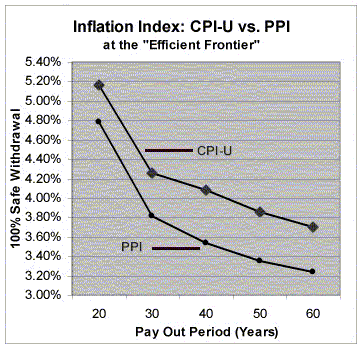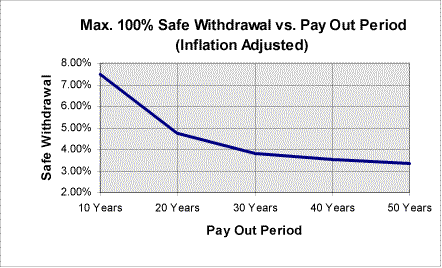I agree with all of that. But, if you have a 20% chance of living to 95 and a 10% chance of being broke at 95, then you have a 2% chance of being both 95 and broke. So the SWR failure rates are overstated to that extent. 90% SWR success is actually a 98% chance that you will not outlive your money. One of the reasons I'd happy to use an WR that is not 100% successful. Of course the other reason is that I will adjust my spending. Then it becomes a 2% chance that I'll have to seriously reduce my spending. Not that it means a whole lot to those looking for 100% success.
I agree that it hits a point of diminishing returns, but I still think that the math fails us, to a degree.
I guess what I'm saying is, if there is a roughly 1:5 chance one of us will live to 95, then I want to plan for that, there is just too high a possibility that it could happen. And then I'll need that money, it makes no difference what happened to the other 4 hypothetical people. And a 95YO female has a 50% chance of living another 3 years.
I guess it comes down to gut feel for me. A 1:5 chance just seems like such a real possibility, that I can't discount it at all. Even 1:10, I'm still thinking, ' but what if I'm that 1?". Getting to 1:20, I guess that's starting to get 'out there' on the odds for me (again, just gut feel). And there is a 5% chance of one of a 65YO couple living to 100. And a 43% chance that a 100 year old female will need money for another 3 years!
Another way to look at it (I may have pulled this one out before) - If you're going on a car trip, and your mechanic says he found a possible issue with the transmission, but he's 95% sure you can make your trip w/o a problem, you wouldn't decide to budget for less gas based on the 5% odds you might not make it, would you? They are two different things.
The main reason for my pessimism regarding expenses in the really old age is that my wife and I have been living close to our parents who are all living in town, and have spent time with them to take care of them to our abilities. And it is disheartening to imagine ourselves in the same state. ...
I'm sorry to hear your father's having those problems. But I also know some elders whose later years have been enhanced because they had the money to spend on better care, or have their home remodeled to accommodate their needs, or maybe they can afford to fly relatives in for a visit, etc. I'd hope to avoid saddling my kids with expenses that I couldn't handle, if it were to come to that.
Obviously, there is no clear or right/wrong answer on this. I guess I even start with feeling like a 100% FIRECALC profile is still risky - things could be worse than past history, my personal spending could go up above inflation - who knows. If preparing a bit better for these other possibilities means shaving a few tenths of a percent of the WR, that's a good balance for me. YMMV.
-ERD50



